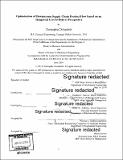| dc.contributor.advisor | Stephen C. Graves and Brian W. Anthony. | en_US |
| dc.contributor.author | DiAndreth, Christopher. | en_US |
| dc.contributor.other | Sloan School of Management. | en_US |
| dc.contributor.other | Massachusetts Institute of Technology. Department of Mechanical Engineering. | en_US |
| dc.contributor.other | Leaders for Global Operations Program. | en_US |
| dc.date.accessioned | 2019-10-11T22:24:54Z | |
| dc.date.available | 2019-10-11T22:24:54Z | |
| dc.date.copyright | 2019 | en_US |
| dc.date.issued | 2019 | en_US |
| dc.date.issued | 2019 | en_US |
| dc.identifier.uri | https://hdl.handle.net/1721.1/122589 | |
| dc.description | Thesis: M.B.A., Massachusetts Institute of Technology, Sloan School of Management, 2019, In conjunction with the Leaders for Global Operations Program at MIT | en_US |
| dc.description | Thesis: S.M., Massachusetts Institute of Technology, Department of Mechanical Engineering, 2019, In conjunction with the Leaders for Global Operations Program at MIT | en_US |
| dc.description | Cataloged from PDF version of thesis. | en_US |
| dc.description | Includes bibliographical references (pages 63-65). | en_US |
| dc.description.abstract | As Boston Scientific's supply chain becomes more versatile in mixing their supply networks across divisions, there is new opportunity to re-optimize product flow downstream of manufacturing based on unique product attributes and network capabilities instead of solely legacy divisional flow. The current organizational structure, methods, and systems prompts product flow to be optimized within functional silos. However, there are no current methods or tools that readily enable management to evaluate the total system in an integrative manner or with respect to specific product attributes. This project aims to improve BSC's ability to determine optimal product flow by introducing a tool that optimizes across the downstream supply chain via an integrative perspective that accounts for product and network attributes. | en_US |
| dc.description.abstract | The integration involves the major cost activities, such as freight, handling, and inventory costs, or what can be termed the total "Cost-to-Deliver" product from a manufacturing facility to end customers. The proposed optimization framework includes the inter-dependencies of cost drivers across the supply chain that are typically missed when solving in functional silos. We develop a decision support tool to determine optimal product flow across the various nodes within the downstream supply chain (manufacturing, sterilization, and multiple tiers of distribution centers) over a single period horizon that can be extend to multi-periods through a present value approach. This tool enables the decision maker to compare directly the trade-offs between two different constrained flows, as well as vary product parameters within this scenario comparison to uncover ideal product segmentation with respect to flow decisions. | en_US |
| dc.description.abstract | To demonstrate the value for the tool, we used it to segment products with respect to the choice of transportation mode on a freight lane. We find that changing the standard transportation mode for several current products would yield five-year net present value savings of 10-35% of their current annual cost-to-deliver. Ultimately the insights gained, and framework leveraged, are relevant to other industries with multinodal supply chains with high-mix products and not just constrained to the Medical Device industry. | en_US |
| dc.description.statementofresponsibility | by Christopher DiAndreth. | en_US |
| dc.format.extent | 65 pages | en_US |
| dc.language.iso | eng | en_US |
| dc.publisher | Massachusetts Institute of Technology | en_US |
| dc.rights | MIT theses are protected by copyright. They may be viewed, downloaded, or printed from this source but further reproduction or distribution in any format is prohibited without written permission. | en_US |
| dc.rights.uri | http://dspace.mit.edu/handle/1721.1/7582 | en_US |
| dc.subject | Sloan School of Management. | en_US |
| dc.subject | Mechanical Engineering. | en_US |
| dc.subject | Leaders for Global Operations Program. | en_US |
| dc.title | Optimization of downstream supply chain product flow based on an integrated cost-to-deliver perspective | en_US |
| dc.type | Thesis | en_US |
| dc.description.degree | M.B.A. | en_US |
| dc.description.degree | S.M. | en_US |
| dc.contributor.department | Sloan School of Management | en_US |
| dc.contributor.department | Massachusetts Institute of Technology. Department of Mechanical Engineering | en_US |
| dc.contributor.department | Leaders for Global Operations Program | en_US |
| dc.identifier.oclc | 1119537448 | en_US |
| dc.description.collection | M.B.A. Massachusetts Institute of Technology, Sloan School of Management | en_US |
| dc.description.collection | S.M. Massachusetts Institute of Technology, Department of Mechanical Engineering | en_US |
| dspace.imported | 2019-10-11T22:24:54Z | en_US |
| mit.thesis.degree | Master | en_US |
| mit.thesis.department | Sloan | en_US |
| mit.thesis.department | MechE | en_US |

